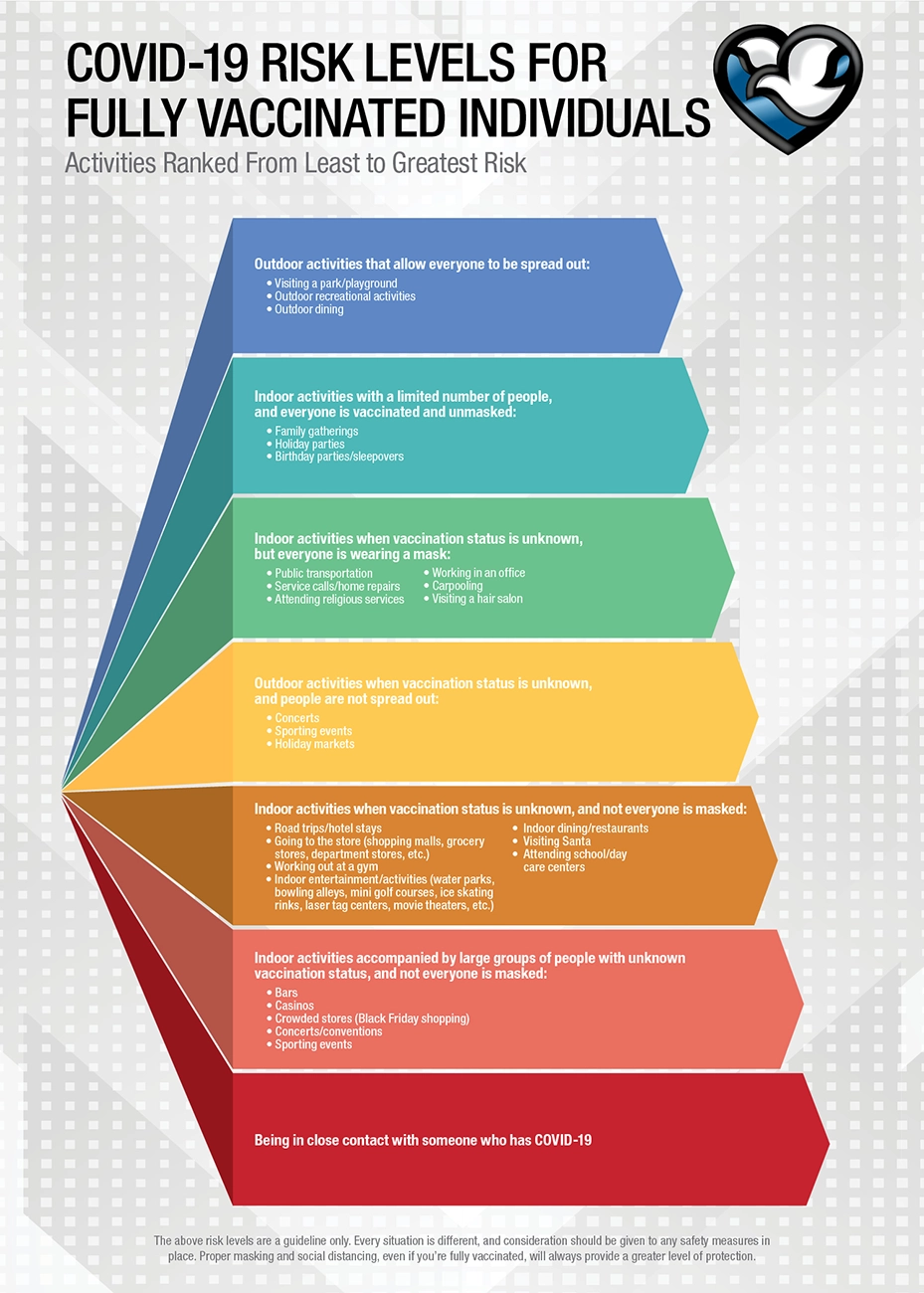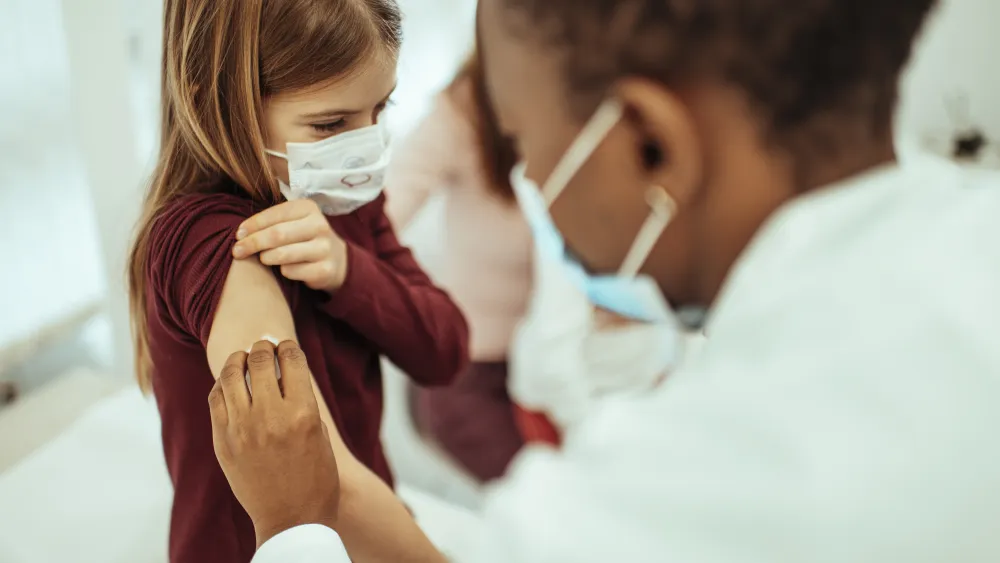
Family Health
So Your Family Is Fully Vaccinated – Now What?
Published: Nov. 22, 2021

Five- to 11-year-olds mark the last in many households to be vaccinated against COVID-19 – and that’s a sigh of relief for a lot of families, especially as the holidays draw near. But what does this mean for masking, gathering, traveling and visiting public places? According to the Centers for Disease Control and Prevention (CDC), only positive things.
Vaccinating 5- to 11-Year-Olds
If you haven’t yet taken your child who’s 5 or older to get their first Pfizer-BioNTech shot, here are a few reminders of why you should consider it sooner rather than later:
- Although kids are more likely to have mild COVID-19 cases, some experience more serious illness. The primary purpose of the COVID-19 vaccines is to prevent severe disease, hospitalization and death. Why would we want our kids to come close to any of those things when it’s all vaccine preventable?
- Vaccinating kids can prevent the spread of COVID-19. By rolling up their sleeves, kids can protect their parents, grandparents, friends and neighbors.
- Vaccination offers kids a return to “normal” while allowing them to participate in activities and attend school with less disruption and risk of infection.
Remember: The sooner that kids in this age group get vaccinated, the sooner they’re protected against a virus that’s expected to wreak more havoc as winter settles in. With more illness expected in the coming months, now’s the time to help your kids start building immunity by getting them vaccinated against not only COVID-19 but also influenza.
Your Family’s Protection After Each Dose
First and Second Dose
Your child will acquire some protection against COVID-19 (including infection caused by the Delta variant) after their first dose, but the protection they’ll receive after their second dose is even more significant. Although there isn’t specific data regarding Pfizer-BioNTech’s first-dose efficacy for 5- to 11-year-olds, the vaccine is showing 91% efficacy at preventing symptomatic disease for these kids two weeks after their second shot.
When it comes to the Delta variant and adults, the Pfizer-BioNTech vaccine is showing 36% efficacy at preventing symptomatic infection two weeks after the first dose, jumping to 88% efficacy two weeks after the second.
Moderna’s vaccine is showing 72% efficacy after the first dose, but there’s not yet enough data on how much protection the second dose yields against the variant.
While the Johnson & Johnson vaccine is showing less efficacy against symptomatic infection than the two-dose vaccines, it’s still quite effective at preventing severe disease caused by the variant.
The takeaway? Get vaccinated. And get the second shot if you opt for a two-dose vaccine to ensure the greatest protection against symptomatic and severe infection.
Booster
As is the case for many vaccines, protection gradually decreases over time. That concept coupled with the more contagious and deadly Delta variant has led to an increase in COVID-19 cases, hospitalizations and even deaths in older, more at-risk individuals.
The largest study regarding the efficacy of boosters showed that a Pfizer-BioNTech booster dose provided 93% efficacy at preventing hospitalization.
While boosters weren’t created to be Delta variant-specific, all of them work to broaden our immune response and restore the fully vaccinated protection that many of us acquired months ago. Everyone 18 years of age and older are eligible for a booster, and it’s recommended that you get one to continue protecting yourself and others against COVID-19.
Life After Full Vaccination
Simply put, vaccination is our best defense against COVID-19 infection. And according to the CDC, anyone who’s been fully vaccinated can resume activities they did prior to the pandemic.
Although that’s welcome news for many individuals, a large majority of people got vaccinated so they could resume mask-free living.
Masking
So when can the masks come off? That depends on a few factors, including:
- The current rate of COVID-19 transmission in your area
- Your underlying health
- The health of those around you
While COVID-19 vaccines do a great job at preventing infection, people with weaker immune systems simply don’t build the same level of immunity as others. If COVID-19 cases in your area are high, if you’re immunocompromised, or if you live, work or go to school with someone who’s at greater risk of severe illness, you may want to continue masking to prevent breakthrough infections and potential spread.
Gathering
If, however, your family is healthy and fully vaccinated, you can feel safe gathering with other healthy, fully vaccinated individuals without masking. Picture this: Mask-free playdates for fully vaccinated children, mask-free gatherings for fully vaccinated adults and a winter much like the ones before COVID-19 entered the scene. And, if more people continue get vaccinated, going anywhere in public without a mask will continue to get safer for everyone.
Traveling
Keep in mind: Masking is still required on public transportation and inside U.S. transportation hubs. Be sure and check the CDC’s international travel requirements if you’re planning a trip outside of the country, and get tested if you come into contact with a COVID-positive person during your trip or develop symptoms upon your return.

If you still have questions about COVID-19 vaccination, don’t hesitate to reach out to your provider. We’re here to validate your concerns and provide factual information to help you make the best, safest decisions for your entire family.


